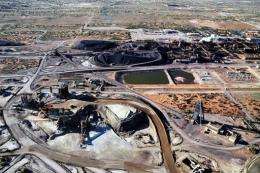Australian miner says any derailment spill 'diluted'

An Australian mining company said Thursday that any hazardous copper concentrate from its operations that may have washed into floodwaters when a freight train derailed had likely been "highly diluted."
OZ Minerals said up to 1,200 tonnes of the substance, which is classed as dangerous and has strict transport conditions, was thought to have plunged into the river when the train derailed in the Northern Territory early Tuesday.
"Given the large volume of water flowing through the system it is likely that any concentrate that has been impacted by the water would be highly diluted," the company said in a statement to the Australian Stock Exchange.
"From an environmental perspective, in consultation with the relevant authorities, concentrate that is accessible will be cleaned up when the area can be safely accessed."
Due to limited access to the area because of the flooding and associated damage, OZ Minerals said it had been difficult to determine "exactly how much copper concentrate may have been directly impacted by the derailment."
There had been about 1,500 tonnes of concentrate on the train in total, worth US$7-8 million, an amount "not considered financially material for the company," it added.
Head of the territory's environment department Jim Grant said the concentrate was not a highly toxic substance, "but it's not to be ingested or inhaled" and was thought to have washed "all over the place".
"It'll present no danger to livestock or kangaroos or birds, but it may have a smothering effect or toxic effect on animals like invertebrates on the bottom of the stream,' he said.
Because it was not soluble, Grant said the concentrate would not have been diluted but the floodwaters would have caused it to spread, lessening its impact.
He stressed that there was no risk to the local town's water supply and he was not aware of any other toxic substances being carried on the train.
The rail owner and operator, US-based Genesee and Wyoming, has defended its decision to operate in the heavy weather caused by ex-tropical cyclone Grant, which was downgraded to a tropical low on Monday.
Environmentalists said the accident, which took place after floodwaters washed away the southern foundation of a rail bridge, showed the dangers of transporting toxic materials by train in the tropics.
"A much bigger risk to Top End rivers would be derailment of trains carrying uranium oxide from the Roxby Uranium Mine in South Australia," said Stuart Blanch, head of the Northern Territory's Environment Centre.
Paul Henderson, chief minister of the territory, said an official investigation would uncover potential failings and he would accept any recommendations made about government regulation to improve safety.
(c) 2011 AFP















